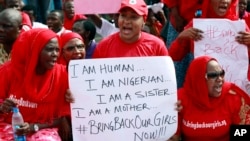WASHINGTON —
While Nigeria's government has accepted offers from the United States, Britain and France to send law enforcement and military experts to assist in the investigation of nearly 300 abducted Nigerian schoolgirls, experts say the U.S. role will likely be limited.
U.S. President Barack Obama is among world officials who have condemned the kidnappings and the Islamist militant group Boko Haram, whose name means "Western education is a sin" and has claimed responsibility for the abductions.
"It's a heartbreaking situation, an outrageous situation," the president said. "This may be the event that helps to mobilize the entire international community - to finally do something against this horrendous organization."
With Nigeria's assent, the U.S. is sending in a variety of military advisers, criminal investigators and hostage negotiators to help find the girls.
Pentagon spokesman Colonel Steve Warren said Wednesday that a handful of U.S. military advisers - less than 10 - is part of the team that will depart within days to the Nigerian capital. He said there are no plans for a U.S. military operation.
"Their mission there is simply to assess and advise," he said. "These personnel will be experts in areas to include communications, logistics, intelligence, all of the functionalities that we believe will be helpful."
Limited assistance
A former U.S. ambassador to Nigeria, John Campbell, now a senior fellow at the Council on Foreign Relations, voiced skepticism at the extent of the U.S. effort.
"I think it is highly unlikely that there would be large numbers of Americans going to Nigeria," he said. "Whatever assistance we might provide, and might be welcomed by the Nigerian side, is likely to be essentially technical."
A former State Department official, Assistant Secretary of State for African Affairs Johnnie Carson, said Nigeria in the past has been reluctant to accept U.S. assistance, believing it can handle its own affairs.
"The government's willingness to accept publicly large amounts of assistance makes it look as though its policies in the past have failed, that it is ineffective and weak in dealing with a domestic issue and that its sovereignty...is being infringed because they can't in fact do it themselves," he said.
Since 2009, Boko Haram has been involved in deadly attacks on schools and suicide bombings, while funding itself with bank robberies., Campbell said, adding that the Islamist militants control as much as a third of Nigeria.
U.S. President Barack Obama is among world officials who have condemned the kidnappings and the Islamist militant group Boko Haram, whose name means "Western education is a sin" and has claimed responsibility for the abductions.
"It's a heartbreaking situation, an outrageous situation," the president said. "This may be the event that helps to mobilize the entire international community - to finally do something against this horrendous organization."
With Nigeria's assent, the U.S. is sending in a variety of military advisers, criminal investigators and hostage negotiators to help find the girls.
Pentagon spokesman Colonel Steve Warren said Wednesday that a handful of U.S. military advisers - less than 10 - is part of the team that will depart within days to the Nigerian capital. He said there are no plans for a U.S. military operation.
"Their mission there is simply to assess and advise," he said. "These personnel will be experts in areas to include communications, logistics, intelligence, all of the functionalities that we believe will be helpful."
Limited assistance
A former U.S. ambassador to Nigeria, John Campbell, now a senior fellow at the Council on Foreign Relations, voiced skepticism at the extent of the U.S. effort.
"I think it is highly unlikely that there would be large numbers of Americans going to Nigeria," he said. "Whatever assistance we might provide, and might be welcomed by the Nigerian side, is likely to be essentially technical."
A former State Department official, Assistant Secretary of State for African Affairs Johnnie Carson, said Nigeria in the past has been reluctant to accept U.S. assistance, believing it can handle its own affairs.
"The government's willingness to accept publicly large amounts of assistance makes it look as though its policies in the past have failed, that it is ineffective and weak in dealing with a domestic issue and that its sovereignty...is being infringed because they can't in fact do it themselves," he said.
Since 2009, Boko Haram has been involved in deadly attacks on schools and suicide bombings, while funding itself with bank robberies., Campbell said, adding that the Islamist militants control as much as a third of Nigeria.




